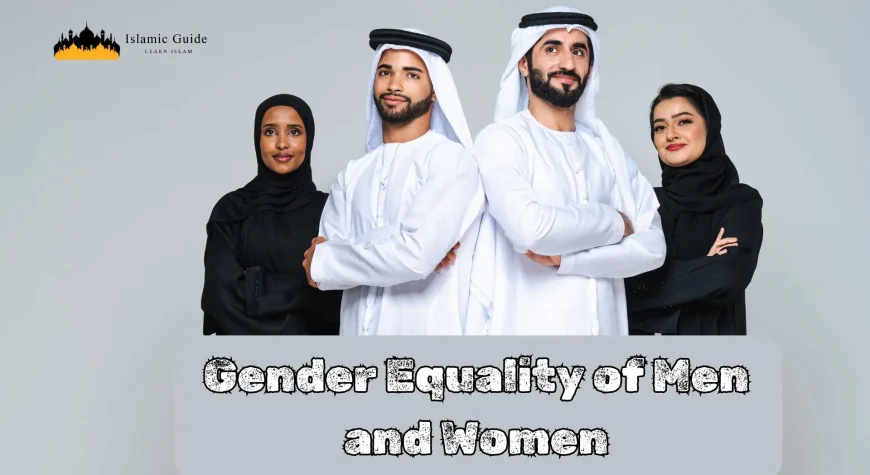Men and Women in Islam: Equality, Roles, and Misconceptions

Islam, a religion followed by over 1.8 billion people worldwide, often sparks conversations about gender roles and rights. Media portrayals and cultural interpretations can sometimes paint an incomplete picture. Let’s deep dive into the core Islamic principles regarding men and women, exploring their foundations, interpretations, and how they translate into daily life.
Contents
Equality in Creation and Spiritual Journey
Holy Quran, establishes the fundamental principle of equality between men and women in their creation and spiritual journey. Here’s how:
- Origin from a Single Soul: The Quran states that humanity originated from a single soul (Quran 4:1). This underlines the inherent oneness of humankind, regardless of gender.
- Equal Path to God: Both men and women are equally capable of achieving spiritual excellence and closeness to God (Allah) through faith, good deeds, and devotion.
- Judgement Based on Deeds, Not Gender: The Quran emphasizes that individuals are judged by their actions and intentions, not their gender (Quran 4:124).
Distinct Roles and Responsibilities
While Islam emphasizes equality, it also acknowledges and celebrates the inherent differences between men and women. These differences can sometimes lead to distinct roles and responsibilities within families and society.
- Biological Differences: Men and women have natural biological differences that can influence their roles within a family. For example, women are typically the ones who carry pregnancies and give birth.
Important Note: It’s crucial to remember that these roles shouldn’t be seen as limitations but rather as complementary strengths that contribute to a well-functioning family and society.
- Social Roles and Responsibilities: Throughout history, different societies have developed social norms regarding gender roles. Islam doesn’t prescribe a rigid set of social roles, but some interpretations emphasize the importance of men being providers and protectors within the family unit.
Key Point: These interpretations are subject to ongoing discussions and re-evaluations within Islamic scholarship. The emphasis is on fulfilling responsibilities with compassion and cooperation.
Men’s Rights and Responsibilities in Islam
Islam also outlines specific rights and responsibilities for men, aiming to create a balanced and just society. Here are some key aspects:
- Leadership and Providing for the Family: Men are traditionally seen as the providers and protectors within the family unit. The Quran encourages men to work and earn a living to financially support their families (Quran 4:34).
- Social Responsibility: Men are encouraged to be active members of their communities, promoting justice, upholding moral values, and helping those in need.
- Spiritual Leadership: Men are often seen as the spiritual leaders of the household, leading prayers and guiding their families in religious matters. However, this doesn’t diminish the importance of women’s spiritual growth and participation in religious activities.
It’s important to remember: These roles shouldn’t be seen as burdens but rather as opportunities to fulfill one’s responsibilities with compassion and leadership.
- Right to Education: Seeking knowledge is obligatory for both men and women in Islam (Quran 26:195). There are numerous examples throughout Islamic history of great male scholars who contributed significantly to various fields.
- Right to Marry: Men have the right to marry and establish families (Quran 2:221). However, Islam emphasizes the importance of treating wives with kindness, respect, and fairness (Quran 4:34).
Balancing Rights and Responsibilities: Men’s rights in Islam are interwoven with their responsibilities. The emphasis is on creating a partnership within the family, where both spouses contribute their strengths and fulfill their duties towards each other and their children.
Women’s Rights in Islam
The Quran grants women a multitude of rights that were revolutionary for their time, including:
- Right to Education: Seeking knowledge is obligatory for both men and women in Islam (Quran 26:195).
- Right to Property Ownership: Women have the right to own and inherit property independently (Quran 4:176).
- Financial Independence: Women can keep and manage their own earnings and are not financially dependent on husbands or fathers.
- Right to Choose a Spouse: Women have a say in choosing their husbands, and their consent is required for marriage (Quran 2:232).
Empowerment Through Islamic Principles: These rights empower women to be financially independent, participate in education and commerce, and have a voice in their own lives.
Misconceptions and Realities
Here are some common misconceptions about women’s rights in Islam and the realities behind them:
- Headscarves and Oppression: Head coverings like hijabs are a matter of personal interpretation and religious devotion, not a symbol of oppression.
- Limited Mobility: While some interpretations might emphasize modesty in dress and behavior, Islam doesn’t restrict women from participating in public life or pursuing careers.
- Domestic Violence: Domestic violence is strictly forbidden in Islam (Quran 4:34).
Remember: Islamic principles promote respect, compassion, and justice for all, including women. Cultural interpretations and social practices can sometimes deviate from these core principles.
Understanding men and women’s rights in Islam requires examining the Quranic foundations, acknowledging diverse interpretations, and recognizing the historical context. Islam promotes equality in creation and the spiritual journey, while acknowledging natural differences that can translate into distinct roles. Ultimately, the focus is on mutual respect, cooperation, and fulfilling one’s responsibilities within the family and society.
Lorem Ipsum

